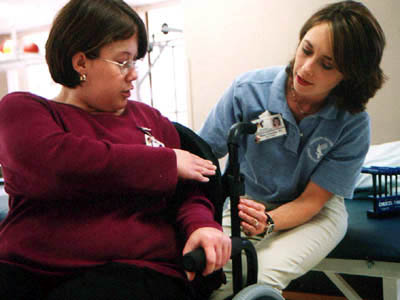JACKSON, Miss.—Physical therapist Allison Fracchia feels frustrated every time she sees a power wheelchair sitting on a Mississippi porch.
She knows that the owner probably ordered the chair off the Internet or TV and didn’t realize it wouldn’t fit through the door.
It’s a common mistake, and one she hopes to help others avoid. Fracchia is coordinator of a new clinic at Methodist Rehabilitation Center that offers guidance and medical evaluations for people in need of wheelchairs, environmental control units (ECUs), augmentative speech devices and computer interface systems.
Located on the Jackson hospital’s second floor, the assistive technology clinic is staffed by a supervising physician, biomedical engineers and occupational, physical and speech therapists.
Fracchia said there’s a demand for the service because the state’s only other comprehensive assistive technology program is at the T.K. Martin Center for Technology and Disability in Starkville.
“Physicians are starting to recognize this is a special field,” said Fracchia, a certified assistive technology practitioner. “They appreciate a therapist’s involvement in the evaluation. Medicare and other insurance carriers are requiring more proof that a person needs equipment because of widespread abuse in the medical equipment industry.”
The clinic is designed to head off problems that can occur when people order adaptive equipment without fully considering their physical and environmental needs.
“Joint contractures can happen if they’re not seated right,” explained clinic physical therapist Cathy Henderson, also a certified assistive technology practitioner. “If they’re on the wrong cushion, they can end up with pressure sores. And if they order a power chair off TV and it doesn’t work in their environment, it may be almost impossible to get Medicare to buy them another one.”
“Another big issue is: How are they going to transport it? Can they put it in their car or truck?”
So far, the clinic has seen the greatest demand for wheelchair fittings. But as people learn about innovations on the Internet, interest in other types of adaptive equipment is growing, Fracchia said. “People are starting to seek out products that can meet their needs.”
One of those seekers is Hugh “Skeeter” Edwards, a resident of Methodist Specialty Care Center in Flowood, a facility for the severely disabled.
Edwards has limited hand control and must rely on others to turn on his room lights or TV. So he’s “very excited” about getting an ECU that will allow him to do everything from surfing the net to phoning friends via a joystick that can be attached to his wheelchair and bed.
“This is going to be awesome,” he said. “Now when I make a phone call I have to get somebody in here to dial it and rig up a way for the phone to be up by my ear. It’s a pain and it keeps you from doing it. I’m the type, I’d rather not ask.”
Bob Hirko, director of biomedical engineering at Methodist, said ECUs can be customized according to each person’s capabilities. For instance, people paralyzed from the neck down might operate a unit via a sip-and-puff device, by pressing a lever with their heads or by speaking into a microphone.
Methodist biomedical engineer John Ramshur said similar adaptations are available for those who want to operate computers. Options for hands-free cursor control range from voice recognition software to systems that can be directed by eye gaze.
Occupational therapist Bridgett Pelts evaluates patients for the ECUs, and she looks at factors ranging from physical strength, endurance and range of motion to vision, hearing and cognitive abilities.
“I also have to take into consideration their respiratory status,” Pelts said. “If they want to do sip and puff and are on a ventilator, I have to consider whether it will compromise their breathing.”
Fracchia said clinic staff members stay abreast of assistive technogy issues by attending international conferences such as the ones sponsored by the Rehabilitation Engineering and Assistive Technology Society of North America. Methodist will sponsor its own seminar Sept. 30-Oct. 1 at Pearl River Resort.
The staff also provides feedback to national vendors to facilitate improvements in the field. For instance, Fracchia recently became one of only 10 therapists in the nation asked to be on TiLite Wheelchairs’ first focus group.
As word has spread of the team’s expertise, demand for wheelchair evaluations has increased, Fracchia said. And she predicts the other services will be equally popular as people with disabilities realize how assistive technology can improve their quality of life.
“It opens their world,” she says. “It allows them to do things and communicate with people in ways they couldn’t otherwise.”

